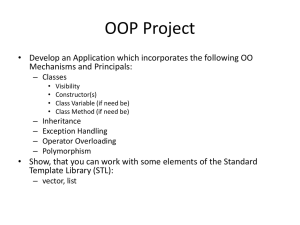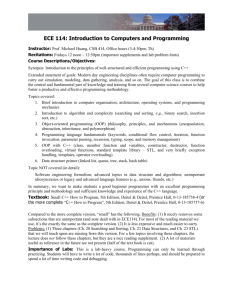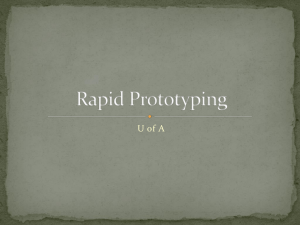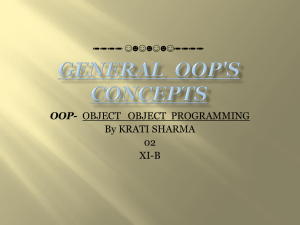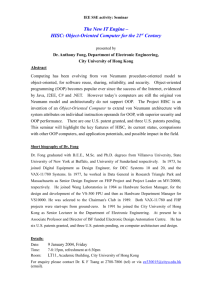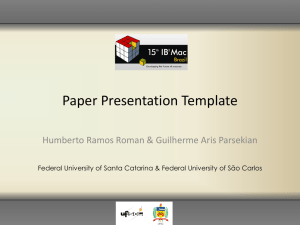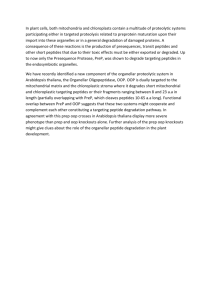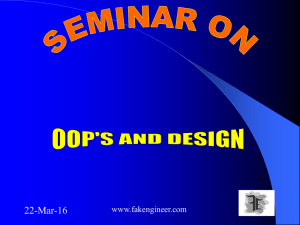ppt
advertisement
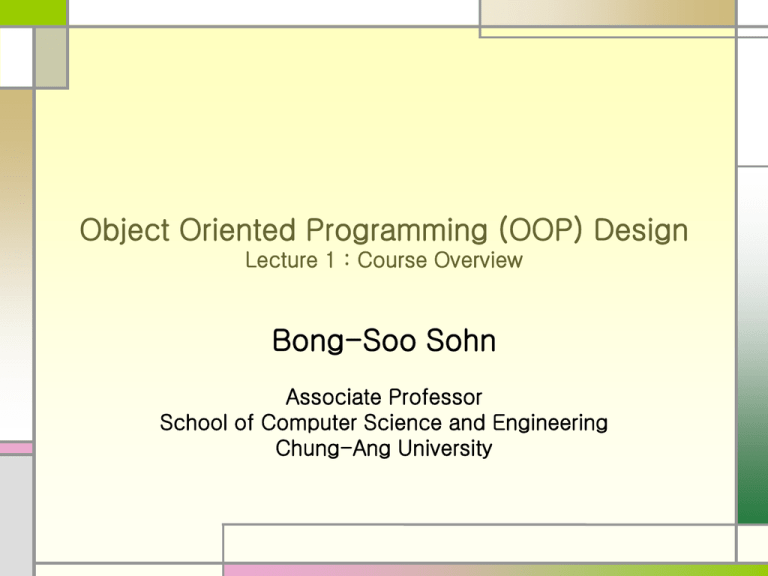
Object Oriented Programming (OOP) Design Lecture 1 : Course Overview Bong-Soo Sohn Associate Professor School of Computer Science and Engineering Chung-Ang University Course Overview Course Topics OOP Concepts Advanced C++ UML (Unified Modeling Language) Data Abstraction/Encapsulation Inheritance Polymorphism Generic Programming and STL (Standard Template Library) Modeling Object-Oriented Software Systems Course Objectives Understand OOP concepts and apply it to real programming Improve the ability of using advanced OOP features of C++ Conduct Team Projects (Large Software Development) Design/Implementation/Documentation Reference Books No Required Textbook. Reference Books “C++ : Effective Object-Oriented Software Construction : Concepts, nd Practices, Industrial Strategies and Practices”, Kayshav Dattari, 2 Edition, 1999 (Page 1 ~ Page 574) nd “Thinking in C++, Volume One: Introduction to Standard C++(2 Edition)”, Bruce Eckel, Prentice Hall, 2000 “Thinking in C++, Volume Two: Practical Programming”, Bruce Eckel and Chuck Allison, Prentice Hall, 2004 Full text of “Thinking in C++” is available as pdf files http://www.cs.ust.hk/~dekai/library/ECKEL_Bruce Some of online materials will be used. Evaluation Midterm Exam : 35% Final Exam : 35% Assignments + Projects : 25% Class Participation and Attendance : 5% You may get F grade if you miss ¼ of the whole classes Instructor Information Name : Bong-Soo Sohn Office : 208-501 (Engineering Building II) Email : bongbong@cau.ac.kr Tel : 820-5843 Office hour : Wednesday 4pm-5pm, or individual appointment Please feel free to contact me for any of class issues. Announcement Class Website http://cau.ac.kr/~bongbong/oop12 Class information such as lecture notes is accessible through this website We will also use e-Class for the submission of homework and project results. Individual Programming Assignments I encourage you to study and discuss together for doing programming assignments. However, you must do programming YOURSELF. You must not share any of source code with other students. Academic dishonesty (e.g. cheating, plagiarism, and etc.) is seriously prohibited. Heavy penalty may be imposed for that. Schedule 1 Course Overview 2 OOP Introduction, Data Abstraction 3 Class and Encapsulation 4 Inheritance 5 Polymorphism 6 Case Study : Bank Account, Billiard 7 Template 8 Midterm Exam Schedule 9 Advanced Template 10 STL (Standard Template Library) 11 STL, Reusability 12 UML Introduction 13 UML diagrams 14 UML practice 15 Term Project Presentation 16 Final Exam Remarks We will mainly use C++ in our lecture. This course assumes that students have basic knowledge of C and C++ grammars and programming ability. We will have significant amount of programming assignments including team projects and presentation. If your programming ability is not good enough, it may be difficulty to follow the class. English Lecture + English Student Presentation Projects Plan Make up a team th Deadline : 11:59pm on Sep. 13 (Thursday) The leader of each team needs to post an article (name/email/student-id# of team members, mark the team leader) in eClass 과제방 Team size : around 6 students per team There will be 4 programming projects during the semester. (2 projects will be done individually, the other 2 projects will be done in team.) We expect to have about 12 teams in our class. Each of 4 teams will present project 1 , 2 , and 3 respectively. th All teams should conduct the final term (4 ) project and give presentation. Team Project Presentation All student presentations should be given in English. Each team should give two presentation. One student is not allowed to give two presentations. (That means, each team will have at least two presenters) I strongly encourage English presenters to register English presentation short-term course. (Bonus scores will be given.)
